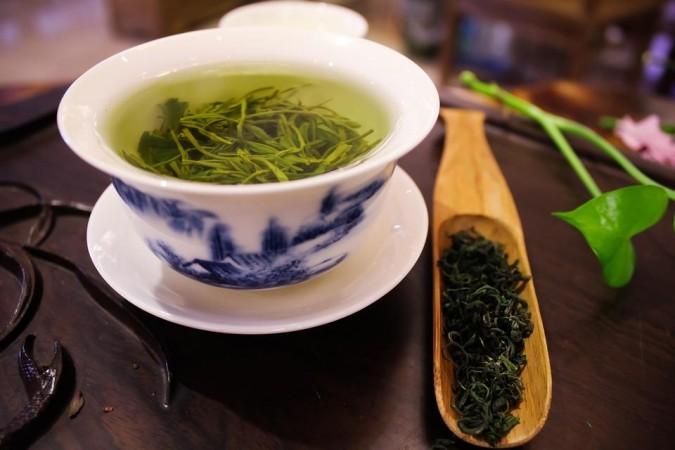The health benefits that a cup of green tea teems with are innumerable. From enabling weight loss to reducing the risk of heart diseases, green tea is touted as an elixir for well-being. So can the brew from the Camellia sinensis plant help fight COVID-19? A new study says that it actually might!
According to scientists, a compound found in green tea—gallocatechin—may help in the development of a drug that can combat the nasty SARS-CoV-2 coronavirus. The study was published in the journal RSC Advance.
"We screened and sorted a library of natural compounds already know to be active against other coronaviruses using an artificial intelligence-aided computer programme. Our findings suggested that one of the compounds in green tea could combat the coronavirus behind Covid-19," said Dr. Suresh Mohankumar, lead author of the study, in a statement.
Seeking Beneficial Compounds

Green tea is acquired from the buds and leaves of the Camellia sinensis—an evergreen shrub—that have not undergone the withering and oxygenation necessary for the production of black tea. They are loaded with phytochemicals such as caffeine and phenols (antioxidants) that are said to give them several healthy properties. Some of them include enhanced fat burning capacity that aids in weight loss; neutralization of free radicals; anti-carcinogenic properties; and prevention of cellular damage, among others.
"Nature's oldest pharmacy has always been a treasure of potential novel drugs and we questioned if any of these compounds could assist us in battling the Covid-19 pandemic?," remarked Dr. Mohankumar. The authors began evaluating the numerous compounds found in green and tried to ascertain which of these may be able to block the SARS-CoV-2 virus.
A total of 132 phytochemicals were virtually screened employing a structure-based in silico technique (computational model) against the main protease, or Mpro, of the novel coronavirus. Mpro is considered an attractive drug target for several coronaviruses, including the SARS-CoV-2. After further analysis, a compound called gallocatechin gallate finally emerged as a viable candidate
Inhibiting the Novel Coronavirus

Next, the team investigated the action of six analogues (structurally different forms) of gallocatechin gallate against main targets of the SARS-CoV-2 such as ACE2 (angiotensin-converting enzyme-2), RdRp (RNA-dependent RNA polymerase), TMPRSS2 (transmembrane protease serine -2), IL-6 (interleukin-6) along with Mpro (main protease). Results from molecular docking revealed that an analogue of gallocatechin known as GC-2 showed potential to block multiple targets of SARS-CoV-2 coronavirus.
Dr. Mohankumar emphasized that the study was a preliminary step, but had the potential to mitigate the COVID-19 pandemic. "The compound that our model predicts to be most active is gallocatechin, which is present in green tea and could be readily available, accessible, and affordable. There now needs to be further investigation to show if it can be proven clinically effective and safe for preventing or treating Covid-19," he highlighted.









!['Had denied Housefull franchise as they wanted me to wear a bikini': Tia Bajpai on turning down bold scripts [Exclusive]](https://data1.ibtimes.co.in/en/full/806605/had-denied-housefull-franchise-they-wanted-me-wear-bikini-tia-bajpai-turning-down-bold.png?w=220&h=138)



